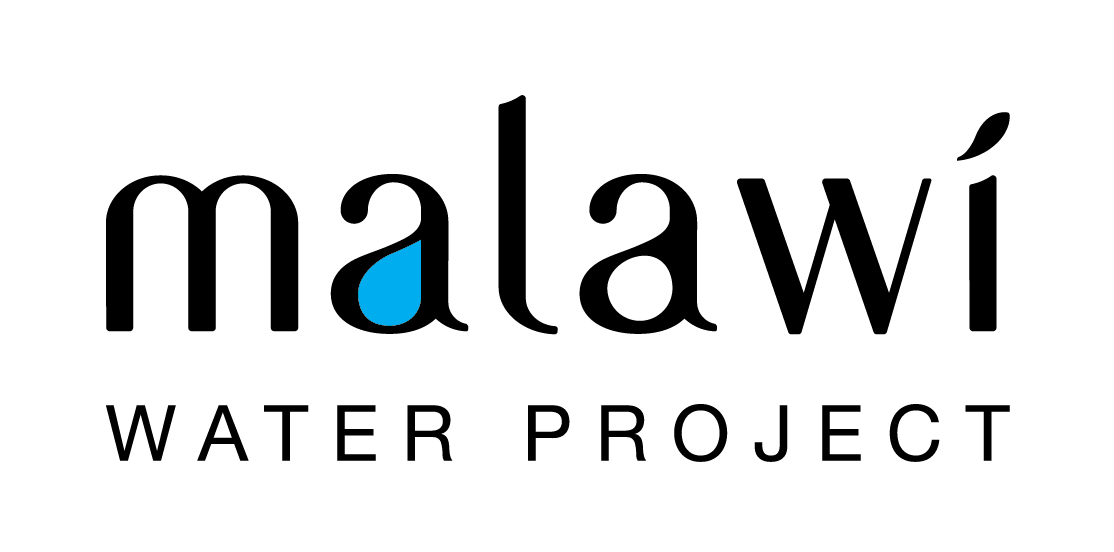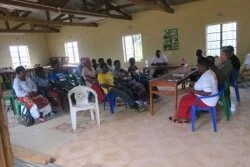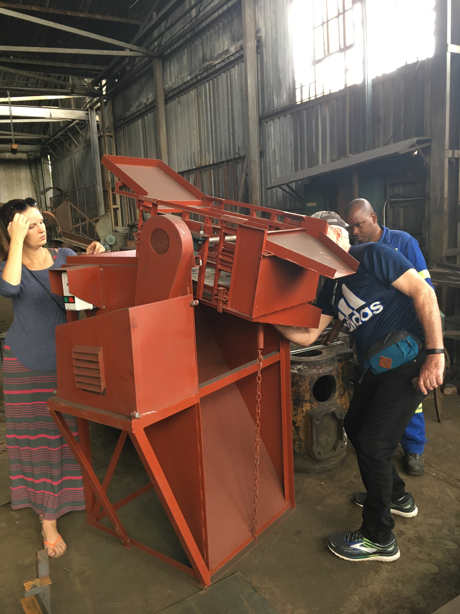May 2018 Trip to Malawi
Sarah with girls
Lunch with North Team
Water source at Kabwafu
Water Source Kabwafu 2
Village at Kabwafu
Clinic Kabwafu
Picture1
Nurse at Clinic
Kawanga village
Sand sorting machine
T-shirts
Team
Safety sign
WASH meeting Derlinie
Sarah, Helen, Derlinie
Making lunch
Oscar checking river
Jerry, Derlinie
Lonnie checking filter
Rubbish pit
Jerry checking latrine
Dish Drying rack
Lonnie with ashes
Kids with Blessings
Constructing filters
Sand analysis
Mary receiving mosquito net
An update from our Board Chair's visit to Malawi - May 2018
We arrived in Lilongwe, (Capital) Sunday afternoon May 6th to start our journey in Malawi. This time I was accompanied by Jerry, my husband who had not been to Malawi before. We stayed at a new guest house just outside of Lilongwe so we had a good rest. We drove to Mzuzu in the North where we stayed for the first week. The weather in Mzuzu was great, it was not too hot. We stayed at the Anglican Diocese Guest house. Sarah, who has been working with the Malawi Water Project and has been in Malawi for the past 2 years, has made connections with a number of girls who live around the Diocese Guest House. They helped us prepare the gift packages for the volunteers and staff.The Guest House staff cooked lunch for the entire MWP team and we took it out to the location of our factory.We ate lunch with the team and volunteers and as a “thank you”, we presented the prepared gift packages from Canada including T-shirts, hats, small bags of toiletries and water bottles. We also gave prepared envelops with a donation for each volunteer to thank them for the work they are doing in helping to wash the sand and gravel for filter installation.Following the lunch, we met with the team members. Since we are delivering filters and working with communities such as Kabwafu, which is a 2 hour drive away from the factory, we have decided to support two volunteers, Margret and Martha, in the community rather than hiring a Community Health Promoter near the factory. These two individuals will be following up on the filters and encouraging villagers to implement proper sanitation and hygiene practices.When we arrived in Kabwafu, we met with the community members including the Traditional Authority which is the head community leader for several villages. Also present were the members of the Health Committee that has been in existence for several years. The TA and chief spoke as well as a representative of the Health Committee. We are encouraging the villages to take responsibility for their own health so I emphasized how important it is for us to work together as a team to get their villages to Healthy Village status.We then went to view some of the homes that had filters and looked at the water sources they are using for drinking. They use holes in the ground that animals also drink from and that had large insects and debris floating in the water. They also use a pond that is used by animals so they are definitely in need of the filters. They do have two boreholes but they are far away. The beneficiaries are very happy with their filters. One woman uses it for everything including cooking, bathing and washing clothes. She is finding that the water is less salty and the white residue that is left on clothes or on her skin is removed from the water.The following day we went to the Mpherembe community which is a community about 15 minutes from Kabwafu and met with the members of their Health Committee who told us about their challenges which included the need for supplies at the clinic and more staff. We toured the clinic and found many people waiting in line to see the Health Services Assistant. (HSA).The Health Services Assistant was a young girl who had been working there for two months. She looked exhausted. She told us that she was working 7 days a week. She probably graduated a few months ago and got a job at the clinic. She has no support and very few supplies.The following morning, we got up early to head to another community on Lake Malawi. It is called Kawanga and the villagers have to use lake water to drink as there isn’t a road to the village to allow the borehole drilling equipment to come into the village. The equipment is too heavy to get there by boat.We have delivered and installed 5 filters in this village as a pilot, so we went to all 5 houses that had filters and conducted follow-up visits.The community members gathered to thank us for our help.We are working with other NGO’s in the area. One is Luke International from Taiwan. Diane, a spokesperson for this organization has committed to donating funds to construct and deliver 30 filters. Cindee Rood who has founded a USA organization called Formidable Joy has committed to donate funds to provide 10 filters. Cindee will be coming to visit this village in July.There is a community in Kawanga that has had two cases of cholera this year. It is not far from the community that we are working in so we are going to deliver some filters there, however, the Chief and Diane are going to try to get the villagers to improve the health and safety of the village before the filters get there.We left the North Project and headed south to Chikwawa where our factory is located. We arrived in Chikwawa to 32 degree heat, however, we were fortunate to have electricity most of the time at Vasco Lodge where we stayed. Since the lodge has installed solar power which kicks in when the electricity is not working. We even had a ceiling fan that was operational most nights.We made a trip to the city of Blantyre to view the sand sorting/washing machine. Everything is ready for installation except the screens. We are waiting for them from Zambia. This machine will provide more consistency in washing the sand and gravel and will allow more filters to be constructed in a day.Evance is a new volunteer who has joined the Project at the factory in order to gain experience. He has graduated from Journalism and needs to have experience in order to apply for a job in his field. He is working on graphics & helping the team with their WASH (Water Sanitation and Hygiene) presentations. He designed the T-shirts that we gave to the volunteers and the golf shirts that we gave to the team.Here are the team members and volunteers in their new shirts. Evance also created signs in Chichewa giving safety instructions that must be followed when constructing the biosand filters.During our time with the South team we watched how the team members conducted a WASH (Water Sanitation and Hygiene) presentation in a village.The team plus all 9 volunteers attended the WASH meeting. The volunteers put on a skit about how the filter prevents illness then the team presented on the requirements of a healthy village. There were several questions about how the filter worked which was good to hear because it means the villagers are interested in the filter. The team members use large printed laminated picture posters to show villagers how the filter works and how to maintain them.Derlinie opened the presentation by telling the villagers about the Malawi Water Project. The Chief is the woman to the right holding the little girl.The audience consisted mainly of women and children. This village is close to the Illovo Sugar Plantation and the majority of men work there and had not returned from work yet. We were impressed at the amount of interest in the filter which was demonstrated by the number of questions asked.The following day we met with the team and they each gave a presentation introducing themselves and telling us what their goals were for the Project in the next 5 years. We listened to their presentations and discussed some of the issues that the team is experiencing.They would all like to reach more villages. They would like a large lorry to deliver filters and media, take the team and volunteers to WASH meetings and get the quarry and river sand. Transportation seems to be an issue in both regions.The team and volunteers get along well together and are like a family. They work together to make lunch for everyone on the days that they are working together at the factory.To get an idea as to how the filters are performing and to receive feedback from the beneficiaries of the filters, we went to conduct 5 follow-up visits in Chimpazi village. This community is across a shallow river which we were able to cross with the vehicle. However, in the rainy season it can’t be crossed and the nearest bridge is many kilometres away.Oscar, our driver and Project Officer, walked across the river to make sure the vehicle would be able to make it.Chimpazi is a farming community. It is in the opposite direction from the sugar plantation so no one works at the plantation. It is a poor community. Homes are made of mud bricks and grass roofs. However, we were impressed with the work that this village has done to keep their village clean and healthy. There are three village members who formed a Health Committee to work with our team and each have a filter. The filters are working well and flow rates are good. The villagers had dug rubbish pits and latrines.They are using dish drying racks and handwashing stations.If they can’t afford soap they use ash which Lonnie, our Community Health Promoter, is showing us in this picture.The kids really enjoy it when the team comes.One of our team members, Blessings is having fun with the kids.When our team goes into a village often the borehole is not working and requires only minor repair. If our biosand implementers were trained on borehole repair they could train villagers how to repair their boreholes themselves. Sometimes the borehole only needs a $2 rubber O-ring. We are looking into getting training for our team members on borehole rehabilitation.Blessings, Aida and Stuward working on constructing 8 filters. All molds are working.When we were at the factory, we also went through the sand sorting analysis with all staff and they seem to know how it is done and how to enter the values in the Excel spreadsheet. The sand sorting analysis determines whether the material from the quarry will give the desired percentages of fine and coarse sand in order to get the appropriate flow rate of the biosand water filter.We had a very productive visit with both the North and South teams. The team members are feeling positive about the work they are doing . Since they are moving further out to more remote villages who are desperately in need of clean water, they are being welcomed by the village leaders. Even though some of the villages are very poor, the villagers are willing to pay something toward their filter and they are willing to carry the filter and the bags of prepared sand and gravel long distances.Because of the generous donation from the Spirit Singers Choir of Deer Park and St. Andrews churches, we were able to purchase 44 mosquito nets that will be given to families identified by our Community Health Promoters as being in the most need.Thank you to everyone who is supporting the Malawi Water Project. We have witnessed the gratitude of the families whose health has been significantly improved because of your concern and caring.



























